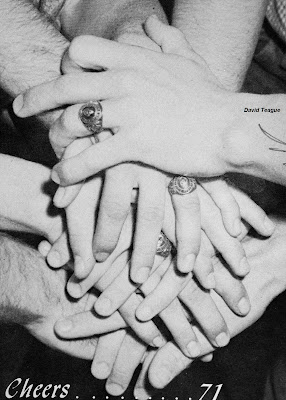While chasing an ancient family line back to an early Jamestown grandfather, many other interesting stories flowed from the study along with a much increased appreciation of this society’s amazing journey through history. In Jamestown Murmurs, I mentioned my earliest New World ancestor, a 10th great grandfather who disembarked during Jamestown’s 14th year.
Discovering a personal connection to an individual who lived here when the New World was populated by only 1200 or so English settlers takes your breath away, especially if you have an active imagination and a reasonable grasp of history. I wondered, if I were he, what I might have wanted to tell some of my descendants if I had had the means to record and preserve my thoughts. That set off a sort of mental time travel exercise where you spend some time in both eras…now and 400-years ago. What would I like to tell and what would I like to hear from each perspective?
For the most part, our lives whether lived in the present or lived 400-years ago, are somewhat similar. The sun comes up, we wake, we’re hungry, maybe a little roll with the gal, must work the crops or we don’t eat later, must work for Dilbert’s pointy haired boss or we don’t eat later, it’s a pretty day—mind wanders, later we’re hungry again, goodness that’s a good lookin’ little gal walking by, maybe another roll with ours later on, getting sleepy, nodding off…tomorrow is another day.
Mixed-in are interactions with other people, irritations, joys…a few truly dumb bastards, fewer still really nasty farts, and now and then a war with another tribe over something no one really understands.
So, what would I really like to hear from g-g-g-g-g-g-g-g-g-g-grandfather Pete? You know, it really doesn’t matter. Anything would do...Pete, tell me about that gal that caught your eye today.
And what would I tell him? Boy, that’s tougher. Could he understand 4G, iPods, Safari, WIN 7, VISTA, XP, or a blue screen flashing “fatal error” usually just means to reboot? I think within an amazingly short time, he probably could. Paris Hilton interacts with her technology, doesn’t she?
We had learned in our corner of the corporate cyber world that once something was digitized, it had the potential to never die which was not any different than any written document. It also had the potential to be misappropriated and misused, so we had to be thoughtful about what we put “out there.”
However, it was also apparent that putting certain things in the hands of others is probably one of the best ways to ensure its survival. Easy duplicating and transmitting brought to us by present day computer technology could be selectively pressed into service as a means of perpetuating the very things you would want to perpetuate; the family tree preservation being one of the most obvious positive aspects.
One of my 4th great grandfathers (1 of 32 individuals at that level) commanded a Virginia County militia during the Revolution. In that position he was responsible communicating with the Virginia governor who at that time was also Virginia’s military commander. In seeking to learn something about grandpa Phil, I found a 1782 letter he wrote to Benjamin Harrison V, then governor of Virginia, a position previously held by Patrick Henry and Thomas Jefferson, among others. Six years before this letter was penned, Harrison along with Jefferson and several others signed the Declaration of Independence in Philadelphia.
Grandpa Phil’s letter was apparently saved as a part of early Virginia government correspondence and has resided in the Library of Virginia archives for many years. It can be downloaded from the Net. Here at least was something in the hand of an early ancestor that, although not directed to me or any other descendent, as I envisage it, provides a fascinating glimpse of a man who is a part of me. Seeing his words written in his own hand was interesting enough, but deciphering the old handwriting was even more interesting.
Grandpa Phil was responding to Harrison’s order that he supply some of his troops and guns. He was complaining that he didn’t have them to give. He explains that he has his hands full defending his own citizens from British depravations along the river and that what canon he had were taken away by the Continentals when they came through the neighborhood some months earlier.
Comparing his words to what was going on in that area at the time the letter is dated revealed that Grandpa Phil’s County was about 25-miles north of Yorktown and the Continentals he mentions were some of the Revolutionary forces assigned to the Yorktown Siege of General Cornwallis that brought an end to the Revolution a few months earlier! What extent Grandpa Phil participated in that historic event isn’t known, but it is reasonably certain that he was there with his militiamen if only to observe or provide replacements now and then.

This small painting is generally considered to be one of the most accurate depictions of the British marching out of their fort bound for English ships that would take them back to England. It was painted a short time after the Yorktown surrender and relied on eyewitness accounts for its detail. Grandpa Phil's County was across the river and north to about the horizon. This view not only portrays the surrender field accurately, it shows enough detail to pinpoint where Grandpa Phil lived and fought.
Adios

















































